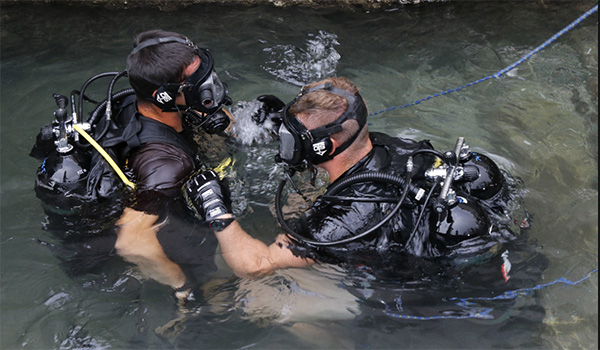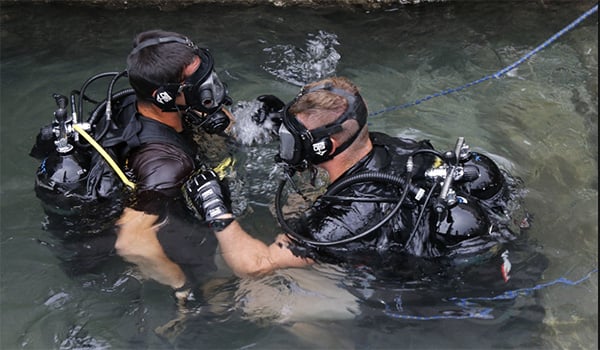
Ask the Flight Surgeon / By MAJ Abigail Vargo, MD: Q: I started taking SCUBA diving classes and the instructor said I should not dive too soon before flying because it increases the risk of DCS. What is DCS, and how does it impact flight status?

Photo courtesy Army.mil
FS: Decompression sickness or “DCS” is a recognized risk of recreational SCUBA diving. DCS is an injury caused by the normal behavior of gas in the body when placed in environments of changing pressure. We think of air as mostly oxygen, but it is only about 21% oxygen while nitrogen, an inert gas, makes up 78%. When we breathe, nitrogen enters our bodies along with oxygen during inhalation and leaves during exhalation with carbon dioxide. Though our bodies do not use nitrogen, it still dissolves in the blood and tissues, and the amount dissolved depends on the ambient air pressure when we breathe it in. According to Henry’s Law, the amount of nitrogen (or any gas) dissolved in a liquid increases with increasing pressure and decreases with decreasing pressure.
As you dive deeper, the pressure on your body increases. In turn, more of the air you breathe, which is mostly nitrogen, will dissolve in your body. When you begin to ascend towards the surface, water pressure decreases, and your tissues start to bubble out the extra nitrogen. This is known as “decompression.” These bubbles can cause some serious health problems. For example, if enough nitrogen bubbles are present, they can collect in joints and cause severe pain or even block the flow of blood to vital organs.
This is why it is important to ascend towards the surface slowly to let nitrogen bubbles form gradually and in small quantities that are easily handled by the body. Dive tables and dive computers that “map out” the depths of your dives have built in “safety stops” a.k.a. “decompression stops.” Deeper maximum depth and longer time at maximum depth require more frequent and longer safety stops.
The concern about flying after SCUBA diving is that as you ascend from sea level, your body experiences further decrease in ambient pressure as you gain altitude. While this is a much less drastic change in pressure than ascending in water, it could worsen a mild, unrecognized DCS event. General recommendations are to wait 12-48 hours after diving before flying, depending on the length and depth of the diving exposures. According to AR 40-8, Army Aircrew should consider themselves down or DNIF until 24 hours after diving.
DCS is often divided into two types. In the less severe Type I, bubbles can cause skin irritation, itching, or pain in the muscles or joints. In Type II, bubbles can affect the lungs, spinal cord, or brain. DCS Type I may only require treatment with 100% oxygen, while DCS Type II often requires higher pressure (hyperbaric) oxygen-therapy in a recompression chamber. Inside the chamber, ambient pressure is increased, with the goal of pushing the troublesome bubbles back into the tissues so that pressure can then be released slowly to prevent or reduce nitrogen bubble formation.
After a single episode of DCS Type I, a Flight Surgeon must wait 72 hours after symptoms have completely resolved before determining that an individual is FFD. A single episode of DCS Type II or more than one episode of DCS Type I is disqualifying from flight and will require the Flight Surgeon to submit a waiver request one month after full resolution of symptoms. A neurology evaluation and neuropsychological testing may be required, depending on the severity of DCS.
As delays in treatment reduce the likelihood of complete recovery, it is important to maintain a high level of suspicion and seek medical care immediately if you suspect a possible DCS event. Recompression chambers are not available in every city, and transportation to the nearest chamber will delay treatment.
Stay safe.
Questions for the Flight Surgeon?
If you have a question you would like addressed, email it to This email address is being protected from spambots. You need JavaScript enabled to view it.; we’ll try to address it in the future. See your unit flight surgeon for your personal health issues.
The views and opinions offered are those of the author and researchers and should not be construed as an official Department of the Army position unless otherwise stated.
MAJ (Dr.) Abigail Vargo, is a flight surgeon at the School of Army Aviation Medicine, Fort Rucker, AL.








